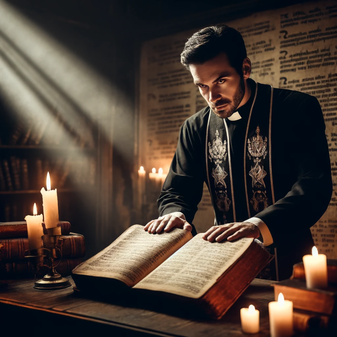|
Encountering Unnamed Demons During Exorcisms
by Pastor Miguel Bustillos, Exorcist www.deliverancexorcisms.com Exorcisms often bring to light the real and troubling interactions between humans and demonic forces. It's not uncommon for individuals performing exorcisms to encounter demons that are not specifically named in the Bible. There are several reasons this might occur, rooted in both the nature of scripture and the realm of the spiritual. 1. The Bible's Selective Detail The Bible is not an exhaustive catalogue of demonic entities. It is a sacred text intended to guide us in faith, morals, salvation, and our relationship with God. Therefore, it focuses more on providing what is necessary for salvation than on detailing every aspect of the spiritual realm. The Holy Scripture mentions certain demons by name not to provide a comprehensive list but to highlight specific lessons or warnings about spiritual warfare. 2. Infinite Variety of Demonic Spirits The spiritual realm is vast and complex. Just as there are countless types of angels, there are likely many types of demons. Theologians and scholars suggest that demons are fallen angels, and just as angels have different ranks and purposes, so too might demons. This variety means that during an exorcism, individuals may encounter demons of various types, most of which are not specifically named in the Bible. 3. The Functionality of Demons In many cases, demons are referred to by the function they perform or the sin they incite, rather than a personal name. For example, spirits of lust, spirits of anger, or spirits of deceit. This naming by function rather than by a proper name aligns with the scriptural focus on teaching us to resist specific sins and to understand the nature of spiritual challenges. 4. Avoidance of Unhealthy Focus By not naming all demons, the Bible also helps prevent an unhealthy focus or obsession with the demonic. If every demon were named and catalogued, it might lead some to a fascination with these dark spirits, contrary to the purpose of scripture, which is to direct us towards God and godliness. 5. Authority Over Demons Through Christ Significantly, the authority to cast out demons comes from Christ, not from a deep or specific knowledge of demonic names. Jesus gave His disciples authority over unclean spirits, demonstrated through commands in His name, rather than through a ritual invocation of demonic names. This shows that Christian authority in spiritual warfare is rooted in one's relationship with Christ and the power of the Holy Spirit, not in the specific knowledge of the demonic realm. 6. Adaptability of Demonic Strategies Demons may manifest differently depending on cultural, geographical, or personal contexts, which might explain the encounter with various unnamed demons. Their strategies can adapt to the vulnerabilities of individuals or societies, making their manifestations and influences uniquely tailored and sometimes not directly reflected in biblical examples. In summary, the encounter with unnamed demons during exorcism highlights the complexity of the spiritual realm and reinforces the need for reliance on divine authority rather than human knowledge. It underscores the Bible's role as a guide to salvation rather than a manual on the demonic, and it points to the power of Christ and the Holy Spirit as the ultimate resource in spiritual warfare.
0 Comments
By Pastor Miguel Bustillos, Christian Exorcist
website: www.deliverancexorcisms.com Understanding Demonic Obsession: A Spiritual Battle for the Mind In the realm of spiritual warfare, demonic obsession stands out as a profound and unsettling disturbance that can ensnare individuals in a relentless grip of intrusive thoughts. This spiritual affliction involves obsessive thoughts that a person has no control over, which persistently preoccupy their mind and divert their focus from God. Here, we explore the nature of demonic obsession, its effects on the individual, and the spiritual remedies available through Christian faith. The Nature of Demonic Obsession Demonic obsession occurs when a demon or unclean spirit imposes persistent thoughts upon an individual. Unlike ordinary temptations or mental health issues, these thoughts are intensely invasive and seem to originate outside the person's control. They are typically negative, distressing, and can involve blasphemous, violent, or otherwise disturbing content. The purpose of these thoughts is clear: to disrupt the person’s relationship with God, instill fear, create confusion, and foster isolation. Symptoms and Effects The primary symptom of demonic obsession is an overwhelming flood of obsessive thoughts that dominate the individual’s mental landscape. These thoughts are not just fleeting worries; they are invasive and persistent, often causing significant anxiety and spiritual turmoil. The person may struggle to pray, read the Bible, or engage in any religious activities due to their mind being preoccupied with these tormenting thoughts. Over time, this can lead to spiritual paralysis, where the individual feels disconnected from God and unable to maintain their religious practices. The Purpose Behind the Attack The goal of demonic obsession is to keep the person's thoughts anchored in fear and away from God. By constantly bombarding them with disturbing thoughts, the demon aims to exhaust the individual's mental and spiritual defenses, making it difficult for them to seek solace in their faith or to reach out to others for help. This isolation can make the individual more vulnerable to further demonic influences or even possession. Spiritual Remedies and Protection 1. Prayer and Fasting: Engaging in prayer and fasting is a powerful way to combat demonic influences. Prayer fortifies the spirit and reestablishes the connection with God, while fasting weakens the physical attachments that might be exploited by demonic forces. 2. Scriptural Engagement: Immersing oneself in the Bible helps to reinforce God’s truth and promises, acting as a shield against the lies and deceptions of demonic forces. 3. Seeking Spiritual Direction: Consulting with a priest, pastor, or a spiritual director who is knowledgeable about spiritual warfare can provide guidance and specific prayers for deliverance. 4. Community Support: Staying connected with a faith community not only provides emotional support but also strengthens one’s spiritual life through fellowship and collective prayer. Demonic obsession is a serious spiritual affliction that targets the mental and spiritual wellbeing of individuals, aiming to sever their connection with God. Recognizing the symptoms and understanding the nature of this attack are the first steps toward seeking help and reclaiming one’s spiritual peace. Through prayer, scriptural engagement, and the support of a faith community, those afflicted can find strength and deliverance. In the Christian journey, no one needs to face these battles alone; the power of Christ and the support of the community provide a formidable defense against demonic forces. 4/25/2024 0 Comments The god of abortion: MolochThe elites gather annually (The Bohemian Grove) to worship Moloch, an ancient deity associated with child sacrifice, and this is the entity they refer to when discussing "God" and women's reproductive rights (the right to have an abortion). Our God, does not condone abortion, as it contradicts the biblical teachings on the sanctity of life. WARNING: THIS IS NOT A POLTICAL BLOG: THEY ARE IN IT TOGTHER. DO NOT BE DECEIVED. In this video, President Biden discusses abortion rights and mentions God in the same sentence. It's important to clarify that the God referenced is not the God of the Bible, it is Moloch, the demon associated with child sacrifice. The true God, the Most High, does not support abortion! All life is created by God and precious from conception.
This belief is rooted in several key scriptural principles: 1. Creation of Life by God: According to the Bible, life is a divine creation. Psalm 139:13-16 speaks of God's intimate involvement in our formation within the womb, illustrating His active role in our creation and His foreknowledge of our lives. 2. Commandment Against Killing: The sixth commandment, "Thou shalt not kill" (Exodus 20:13), is often cited in Christian teachings as encompassing all human life, including the unborn. This directive underscores the biblical mandate to preserve life. 3. Value of Each Person: The Bible emphasizes that each person is valuable to God. Jesus’ teachings in the New Testament, which include caring for the vulnerable and voiceless, reinforce the view that all stages of human life are worthy of protection and care. 4. Biblical Warnings Against Shedding Innocent Blood: Scriptures clearly condemn the shedding of innocent blood (Proverbs 6:16-17). The unborn, being the most innocent and defenseless form of human life, are often included in this category by those who hold this view. The act of terminating a pregnancy is contrary to God's will due to the intrinsic value and sanctity attributed to human life right from conception. Moloch the god that requires child sacrifice: The Bible addresses the sanctity of life and draws connections between the practice of abortion and the worship of ancient deities like Moloch, reflecting on these practices' modern manifestations, particularly among political elites. The Sanctity of Life in the Bible Scriptures such as Psalm 139:13-16 reveal God’s intimate involvement in our creation, even from the womb. This passage poetically describes how God knits us together, recognizing our substance even when we are unseen. The Law of Moses, as found in Exodus 21:22-25, also provides insight, suggesting that harm inflicted on an unborn child is a serious offense, thereby upholding the child’s worth and protection under divine law. Moloch and the Abomination of Child Sacrifice In the ancient Near East, the worship of Moloch was marked by the abhorrent practice of child sacrifice. Parents would offer their children to Moloch, believing that such sacrifices would secure economic prosperity or divine favor. The Bible vehemently condemns this practice through stern prohibitions in Leviticus 18:21 and Leviticus 20:2-5, where God declares such actions detestable and deserving of severe punishment. These passages underscore the stark contrast between pagan practices and the teachings of Scripture, which advocate for the preservation and respect of life. Modern Parallels and Symbolic Idolatry The analogy between the ancient worship of Moloch and contemporary practices of abortion is drawn to highlight a perceived parallel in the underlying motivations—a pursuit of personal or economic benefit at the expense of life. In political rhetoric, particularly within certain circles in Washington DC, this comparison is used to critique policies and attitudes that prioritize personal gain over ethical considerations. It's argued that just as Moloch worship was an idolatrous defiance of God’s commandments, so too can abortion be seen as a modern form of idolatry when it transgresses biblical values about life. Confronting the Spirit of Leviathan: Strategies for Spiritual Warfare
By Pastor Miguel Bustillos, Exorcist website: www.deliverancexorcisms.com In the landscape of spiritual warfare, the spirit of Leviathan holds a notorious position, often associated with deep-seated pride and resistance to spiritual authority. This blog explores the biblical portrayal of Leviathan, its symbolic meanings, and practical steps believers can take to confront this formidable adversary in their spiritual lives. The Biblical Depiction of Leviathan Leviathan is referenced several times in the Old Testament, most notably in the books of Job, Psalms, and Isaiah. Described as a powerful sea creature or dragon, Leviathan symbolizes more than just a physical beast—it represents overarching spiritual themes of chaos and opposition to God. - Job 41 provides a detailed description of Leviathan, portraying it as a creature of immense strength, impervious to human weapons. This chapter paints Leviathan as a force that cannot be tamed by human hands, emphasizing its invulnerability and fearsome nature. - Psalm 74:14 and Isaiah 27:1 both depict God’s triumph over Leviathan, illustrating that while Leviathan is powerful, it is ultimately subject to divine authority. These passages symbolize God's ability to control chaos and defeat forces of evil. Symbolic Interpretations of Leviathan In spiritual terms, Leviathan is often interpreted as a symbol of pride and the principal cause of division and strife within communities and individual lives. Its characteristics include: - Pride: Leviathan is chiefly associated with pride, often considered the root of all other sins and spiritual maladies. It represents an arrogant spirit that elevates itself against the knowledge of God. - Resistance to Spiritual Authority: Leviathan is also symbolic of a spirit that opposes divine truth and order, creating confusion and chaos. - Source of Division: This spirit can manifest in communities and relationships, causing misunderstandings, communication breakdowns, and separations. Strategies for Overcoming the Spirit of Leviathan Dealing with Leviathan requires both awareness of its manifestations and spiritual resilience. Here are some steps believers can undertake to combat this spirit: 1. Recognition and Repentance: The first step in overcoming Leviathan is recognizing the signs of pride and self-exaltation in one’s life. Repenting for these attitudes and seeking humility is fundamental. 2. Prayer and Fasting: Engaging in focused prayer and fasting can help break the influence of Leviathan. These spiritual disciplines invite God's intervention and strengthen one’s spiritual resolve. 3. Scriptural Meditation: Regularly meditating on scriptures that emphasize humility, God’s sovereignty, and the importance of community can fortify believers against the deceptions of Leviathan. 4. Seeking Accountability: Being accountable to others in a spiritual community helps maintain a posture of humility and guards against the isolating influence of pride. A Prayer Against Leviathan Here is a prayer for those seeking to overcome the influence of Leviathan in their lives: Lord God Almighty, I come before You recognizing the presence of pride and division in my life, influenced by the spirit of Leviathan. I repent for allowing these sinful attitudes to take root in my heart. In the mighty name of Jesus, I renounce the spirit of Leviathan and its effects on my life. I ask for Your grace to cultivate humility and for the wisdom to recognize and reject prideful thoughts. Help me to uphold Your truth and maintain unity with my brothers and sisters in Christ. I declare that You are my Lord, and under Your authority, I claim victory over the spirit of Leviathan. Cover me with Your protection, fill me with Your Spirit, and guide me in Your ways. I thank You for Your promise of deliverance and the ultimate victory in Christ Jesus. Amen. ` Understanding and confronting the spirit of Leviathan is essential for maintaining spiritual health and communal harmony. By recognizing the manifestations of this spirit and actively seeking God's guidance, believers can effectively combat the destructive influences of pride and division. May this knowledge empower you to live in the freedom and unity that God intends. The Necessity of Accountability: Correcting Errors in Church Leadership
By Pastor Miguel Bustillos, Exorcist www.deliverancexorcisms.com As a shepherd of God's flock, each pastor is entrusted with the profound responsibility of guiding and protecting their congregation. This duty not only involves leading by example but also ensuring that the teachings and practices within the church adhere strictly to biblical truths. However, what happens when leaders stray from these scriptural foundations? The importance of calling out and correcting errors among pastors cannot be overstated, as it is essential for maintaining the integrity and spiritual health of the church. Upholding Biblical Truth First and foremost, pastors are charged with the duty of preserving doctrinal purity. We are keepers of the faith, tasked with teaching the gospel accurately and faithfully. When deviations occur, they can lead to widespread doctrinal errors, potentially misleading many. As written in Titus 1:9, a church leader "must hold firm to the trustworthy word as taught, so that he may be able to give instruction in sound doctrine and also to rebuke those who contradict it." This directive underscores the necessity of confronting errors, ensuring that the whole body remains grounded in correct teaching. Integrity of the Church The integrity of the church largely depends on the credibility and ethical conduct of its leaders. Paul instructs in 1 Timothy 5:19-20 that accusations against elders must be handled with extreme care, but persistent sin needs to be addressed openly, serving both as a correction and a deterrent. This transparency is vital for maintaining the trust and spiritual welfare of the congregation, ensuring that the church is a refuge of truth and goodness. Leadership Accountability Accountability is crucial in all spheres of life, particularly in spiritual leadership. This process helps prevent abuses of power and ensures that leaders focus on serving with humility and integrity. It's not just about correction, but about promoting a culture where continual spiritual growth and ethical conduct are at the forefront. Leaders are human and fallible, and accountability mechanisms are necessary to help them stay true to their calling and responsibilities. Fostering Spiritual Growth Correcting errors should always aim for restoration and spiritual growth. The goal is not to punish but to guide the errant back to the right path. This process should be undertaken with a spirit of gentleness and love, as advised in Galatians 6:1. By doing so, we not only correct but also model the process of repentance and recovery, encouraging a church culture where growth and humility are embraced. Protecting the Flock As an exorcist, I am acutely aware of the spiritual dangers that can infiltrate and affect the church. Pastors are spiritual guardians, analogous to shepherds guarding their sheep from wolves. This protective role is crucial and is emphasized in Acts 20:28-31, where Paul warns the Ephesian elders to watch out for and counteract harmful teachings from both within and outside the church. Our duty is to shield our flock from spiritual threats and guide them in truth and safety. Confronting and correcting errors within church leadership is not merely an administrative function; it is a biblical mandate that protects the church’s spiritual integrity and promotes a healthy, thriving community of believers. As leaders, let us commit to this task with courage and love, ensuring that our ministries reflect the truth and grace of God. 4/12/2024 0 Comments Why Christian Exorcists Can Be as Effective, If Not Better, Than Catholic ExorcistsWhy Christian Exorcists Can Be as Effective, If Not Better, Than Catholic Exorcists
By Exorcist Miguel Bustillos www.deliverancexorcisms.com The efficacy of exorcisms within different Christian traditions is a subject of debate and personal belief, but many argue that Christian exorcists outside the Catholic Church can be as effective, if not more so, than their Catholic counterparts. Here are some reasons why: 1. Directness and Flexibility in Practice Christian exorcists often operate with more flexibility than Catholic exorcists. They are not bound by the stringent rules and formal rites that the Catholic Church mandates. This flexibility allows them to adapt their approach to the needs of the person and the specific circumstances they face. For instance, a non-denominational Christian exorcist might use spontaneous prayer and direct commands in Jesus' name, which can be tailored in real-time during an exorcism. 2. Emphasis on Personal Faith and Authority In many Protestant and non-denominational Christian traditions, there is a strong emphasis on the authority of the believer. This belief stems from interpretations of scriptures like Luke 10:19, where Jesus tells His disciples, “I have given you authority to trample on snakes and scorpions and to overcome all the power of the enemy; nothing will harm you.” Many Christian exorcists believe that this authority is conferred to all believers, not just a select group of ordained clergy. This can empower individuals to confront demonic entities with confidence in their spiritual authority. 3. Immediate and Accessible Responses Unlike the Catholic tradition, where a formal diagnosis and permission from a bishop are typically required before an exorcism can proceed, Christian exorcists can respond more rapidly to situations they believe to be demonic oppression. This accessibility can sometimes be crucial in providing immediate relief to those suffering from severe manifestations of possession. 4. Integration with Charismatic Gifts Many non-Catholic Christian exorcists are part of charismatic movements that emphasize gifts of the Holy Spirit, such as prophecy, healing, and discernment of spirits. These gifts are believed to enhance the exorcist’s ability to detect and expel demons effectively. The charismatic approach often involves a more experiential and emotional connection, which can be particularly powerful in pastoral care and deliverance ministries. 5. Community Support and Prayer Exorcism in non-Catholic settings often involves a strong community element, with group prayer and support playing a central role. This can lead to a more supportive environment for the afflicted individual, which might contribute to the overall effectiveness of the deliverance process. Community prayer can amplify the spiritual power perceived to be at work, reinforcing the faith of both the exorcist and the person receiving ministry. 6. Psychological and Pastoral Care Many Christian exorcists combine their spiritual practices with psychological and pastoral care. Recognizing the complex nature of what might appear to be demonic possession, they often consider mental health issues and provide holistic care that addresses emotional, psychological, and spiritual needs. This integrated approach can sometimes lead to better outcomes for individuals who are suffering. While the effectiveness of exorcisms can vary and is often a matter of personal and doctrinal belief, these aspects highlight how Christian exorcists outside the Catholic tradition may be as effective—or in some views, more effective—than Catholic exorcists. The key difference lies in their approach, the autonomy they enjoy, and the emphasis on the authority and power of the individual believer. The Challenges and Attacks Faced by Deliverance Ministers
By Pastor Miguel Bustillos, Deliverance Minister and Exorcist Deliverance ministry is a spiritual practice that involves helping individuals break free from what are believed to be demonic influences or oppressions. Ministers who specialize in deliverance often find themselves at the forefront of spiritual warfare, confronting not just the supernatural but also the skepticism and misunderstanding of the world around them. Here are some of the common challenges and attacks deliverance ministers face: 1. Spiritual Attacks Given the nature of their work, deliverance ministers are believed to be prime targets for spiritual attacks. These can manifest in various forms, such as oppressive thoughts, nightmares, or unexplained physical ailments. The belief is that these attacks are attempts by demonic entities to hinder the minister's work or to instill fear and doubt. 2. Misunderstanding and Skepticism In a world that increasingly values empirical evidence and scientific explanations, the concept of demonic possession and deliverance can be met with skepticism. Deliverance ministers often face criticism and disbelief from both secular and religious communities. This skepticism can lead to social isolation and can make it challenging for ministers to find support and understanding. 3. Emotional and Physical Drain The work of deliverance is not only spiritually demanding but can also take a toll on the minister's emotional and physical well-being. Engaging with individuals who are believed to be oppressed by demonic forces can be emotionally draining. Moreover, the intense prayer and spiritual warfare associated with deliverance can lead to physical exhaustion. 4. Financial Struggles Many deliverance ministers operate independently or within small ministries, which can lead to financial struggles. The lack of steady income and the expenses associated with ministry work can be significant challenges. Additionally, the controversial nature of their work can make it difficult to find financial support or resources. Conclusion Deliverance ministers face a unique set of challenges and attacks, both spiritual and worldly. Despite these obstacles, many remain committed to their calling, believing in the importance of their work in bringing freedom and healing to those they believe are oppressed. As with any spiritual practice, it is essential for deliverance ministers to find a balance between their ministry work and their personal well-being, seeking support and guidance to navigate the complexities of their calling. By Pastor Miguel Bustillos. Deliverance Minister and Exorcist
Founder of the Children's Bread Deliverance Ministry For Deliverance or Exorcism: www.cbdmchurch.com Submitting to God: The First Step to Spiritual Empowerment Submission to God is not about losing our freedom; rather, it’s about finding true freedom in the embrace of divine guidance and protection. By submitting to God, we align ourselves with His will, His word, and His wisdom, laying a solid foundation for our spiritual journey. The Power of Prayer and Worship Prayer and worship are the languages of submission. Through them, we express our dependence on God, our trust in His sovereignty, and our commitment to follow His lead. They are the means by which we draw near to God, and in return, He draws near to us, providing us with the strength and protection we need. Living According to God’s Word Submission to God also means living our lives according to His Word. The Bible is not just a book; it’s the living word of God, a guide for life that offers wisdom, direction, and comfort. By adhering to its teachings, we make ourselves resilient against the devil’s schemes. Resisting the Devil: The Act of Spiritual Defiance Resisting the devil is an active defense mechanism in our spiritual arsenal. It involves recognizing the devil’s temptations and refusing to give in to them. This section explores how to effectively resist the devil and ensure his departure from our lives. Recognizing the Devil’s Tactics The first step in resisting the devil is recognizing his tactics. He often uses deception, doubt, and temptation to derail us from our spiritual path. Being aware of these strategies helps us to stand firm in our faith and not be swayed by his lies. The Armor of God: Your Spiritual Defense Ephesians 6:10-18 describes the armor of God, a metaphorical representation of the spiritual defenses available to us. Each piece of the armor has a specific role in helping us stand against the devil’s schemes, ensuring we are not left vulnerable to his attacks. The Promise of Victory: He Will Flee From You The promise found in James 4:7, “Submit yourselves, then, to God. Resist the devil, and he will flee from you,” is not just an assurance but a spiritual law. By submitting to God and resisting the devil, we activate a divine principle that guarantees the devil’s retreat. Testimonies of Triumph Countless testimonies bear witness to the effectiveness of this spiritual strategy. Individuals from diverse backgrounds share how submission to God and resistance against the devil brought significant breakthroughs and freedom in their lives. Nurturing Your Spiritual Strength The journey doesn’t end with a single victory. Maintaining spiritual strength requires continuous effort in prayer, studying the Word, and living in submission to God. This ongoing commitment ensures that we remain under God’s protection and guidance, ready to resist the devil whenever he attempts to return. Submitting to God and resisting the devil is a powerful spiritual discipline that leads to freedom, peace, and victory in our lives. By understanding and applying these principles, we can navigate our spiritual journey with confidence, knowing that we are backed by the ultimate power of God. As we continue to walk in submission to Him and stand firm against the devil, we can rest assured that victory is not just possible; it’s promised. The Essential Guide to Finding the Right Deliverance Minister
Deliverance ministry is a profound aspect of spiritual practice that focuses on freeing individuals from spiritual burdens and negative influences. It's a deeply personal journey that requires not just faith, but also trust in the deliverance minister guiding you through the process. Selecting the right deliverance minister is crucial for a transformative experience. This guide provides comprehensive insights into understanding deliverance ministry, preparing for deliverance, and choosing a minister that aligns with your spiritual needs. Understanding Deliverance Ministry Deliverance ministry serves as a beacon of hope for many seeking spiritual liberation. It involves practices aimed at releasing individuals from the grip of negative spiritual influences and guiding them towards a path of spiritual renewal and enlightenment. Understanding its roots and current relevance provides a solid foundation for those considering this journey. The Role of a Deliverance Minister A deliverance minister acts as a spiritual guide, equipped with the knowledge, faith, and compassion required to navigate the complexities of deliverance. Their role extends beyond performing deliverance sessions; they also offer support, understanding, and spiritual counsel to those they assist. Key Qualifications for a Deliverance Minister Identifying a qualified deliverance minister involves looking for a combination of spiritual depth, theological education, and practical experience in the ministry. These qualifications ensure that the minister is well-equipped to handle the delicate and complex nature of deliverance work. Preparing for Deliverance Preparation is key to a successful deliverance experience. It involves introspection, prayer, and setting the right expectations. Understanding how to prepare can significantly impact the effectiveness of the deliverance process. Self-Assessment Before Deliverance Before embarking on a deliverance journey, it's essential to assess your spiritual state and readiness. This preparation helps in aligning your expectations with the process and enhances receptivity to the minister's guidance. What to Expect During a Deliverance Session Familiarizing yourself with the deliverance process can alleviate anxiety and foster a more open and receptive state of mind. Knowing what to expect helps in building trust and cooperation between you and the minister. Choosing the Right Deliverance Minister The choice of a deliverance minister should be made with careful consideration of your spiritual needs and the minister's qualifications. Research and Recommendations Seeking recommendations and conducting thorough research are essential steps in finding a reputable deliverance minister. This process includes evaluating testimonials and experiences of others to gauge the minister's effectiveness and approach. Red Flags to Watch Out For Awareness of potential red flags can protect individuals from engaging with ministers who may not have their best interests at heart. This knowledge is crucial for avoiding negative experiences and ensuring a safe and positive deliverance process. Testimonies of Transformation Sharing testimonies from those who have undergone deliverance can offer hope and encouragement to others considering this spiritual journey. These stories highlight the transformative power of deliverance ministry when guided by the right minister. FAQs on Deliverance Ministry Addressing common questions about deliverance ministry can dispel misconceptions and provide clarity to those exploring this spiritual path. This section aims to offer answers based on biblical principles and the experiences of seasoned ministers. Nurturing Your Spiritual Journey Post-Deliverance The journey doesn't end with deliverance. Maintaining and nurturing one's spiritual health is essential for continued growth and freedom. This section provides resources and practices for sustaining spiritual well-being after deliverance. Choosing the right deliverance minister is a crucial step in a journey towards spiritual freedom and renewal. By understanding the importance of this decision, preparing adequately, and following the guidance provided, individuals can embark on a transformative spiritual journey with confidence and hope. Article written by Pastor Miguel Bustillos, Deliverance Minister and Exorcist. To sign up for Deliverance Ministry: www.deliverancexorcisms.com |
The Author:
Rev. Miguel Bustillos (Born-Again Christian) is currently the Senior Pastor of the Children's Bread Church. He is a graduate of The International School of Exorcism, The Advance Academy of Deliverance and Life Christian University, with an Advanced Degree in Theology. Furthermore, He has studied Demonology from many other institutions, including the International School of the Word (ISOW). In addition, he is also a graduate of the Regina Apostolorum in Rome, where he studied "The Rite of Exorcism and Deliverance". He trained with some of the world's top exorcists. He has freed hundreds of God's Children from demonic attacks and torment, in Jesus' name. Jesus gets all the glory. Rev. Miguel is a well known and highly sought after Exorcist and Deliverance Minister in the Washington DC, Maryland, and Virginia area. He was a guest speaker in 2019's International School of Exorcist convention. He received his ordination from Life Christian University. Before getting into ministry, he worked in the healthcare field for 18 years. He became a professor of healthcare at a university in Arlington Virginia and climbed through the ranks to become Program Director and finally Academic Dean. He left his position as Academic Dean to become a full-time Deliverance Minister. He holds terminal advance degrees in Business and Cardiopulmonary Sciences. Archives
July 2024
CategoriesAll 1 Peter 5:8 3 A.M. Challenge 500 Years Of Reformation 8 Lies About God That Sound Like Truth Abandonement Abortion Abusive Husband Abusive Wife Accountability Achan Adam Addicted To Social Media Adopted Advance Academy Of Deliverance African Ahab Alcoholism Alexander Pagani Alien Alien Deception Aliens Aliens Are Demons Aliens In Nevada Aliens Movie Alter Ego Alter Personalities Alters Am I Demon Possessed? Am I Saved Ancestral Dissociative Disorder Ancestral Sins Ancestral Spirits Ancestral Witchcraft Anchor Ancient Ancient Aliens Ancient Demons Anegsl In Battle Angels Angels Against Demons Angels Versus Demons Annabelle Annabelle Doll Anointed Cross Anointing Anointing Oil Apostle Apostle Miguel Bustillos Archangel MIchael Area 51 Are We In Tribulation Armed And Dangerous Armor Of God Armor Of God Against Demonic Forces Asbury Revival Asmodeus Assurance Of Salvation Astral Projecting Witches Astral Projection Astrology Astro Projecting Attacks Of The Devil Attacks On The Mind Audrey Huff Authority In Jesus' Name Authority Of The Believer Baal Baba Yaga Bad Behavior Bad Thoughts Baptism Baptism And Salvation Baptism In Ministry Bastard Behavior Modification Behavior Of Demons Behemoth Belial Best Christian Tattoos Best Deliverance Minister Best Deliverance Ministers Best Deliverance Ministry Best Exorcism Best Exorcist Best Finance Courses Online Best Halloween Costume Best Way To Kill Myself Bhudhism Bible Bible Museum Bible Reflections Bible Teachers Bible Truths BIBLE VERSES ABOUT FINANCIAL CURSES Biblical Condemnation Of Witchcraft Biblical Deliverance Biblical Deliverance Minister Biblical Living Biblical Perspective On Spiritual Spouses Biblical Prophets Biblical Protection Biblical Provision Stories Biblical Response To Witchcraft Biblical Steps To Inner Healing Biblical Teaching Biblical Teachings On Prophets Bishop Bitterness Blaspheming The Holy Spirit Blasphemous Thoughts Blessed Oil Blessing Blessings Blog Blood Curses Bloodline Blood Line Bloodline Curse Blood Line Curses Bloodline Curses Blood Sacrifice Bob Larson Bob Larson Books Bob Larson In Maryland Bob Larson Live Bob Larson Ministries Bob Larson Ministry Bob Larson YouTube Body Body Art Body Soul And Spirit Body Soul And Spirit Explained Body Soul And Spirit Simple Explanation Book Of Acts Born Again Born Again Christian Born Out Of Wedlock Break Free From Bondage Breaking A Curse Breaking A Spell Breaking Blood Sacrifices Breaking Curses Breaking Curses Of Failure Breaking Curses Of Money Breaking Financial Curses Breaking Free Breaking Freemansory Curses Breaking Freemasonry Curses Breaking Generational Curses Breaking Silver Cords Breaking Spells Breaking Spiritual Strongholds Breaking The Curses Of Finances Breaking The Financial Curse Breaking Witchcraft Breaking Witchraft Breaking Word Curses Brett Kavanaugh Broken Heart Broken Hearted Brother Carlos Oliveira Burning Man Festival Can A Christian Have A Demon Can A Christian Have Demons? Cancelling Curses Cancer Can Demons Cause Sickness Card Reading Cars CASH Casting Demons Out Casting Demons Out Of Children Casting Our Demons Casting Out Demons Casting Out Demons Casting Out Demons 2020 Casting Out Demons From Children Casting Out Demons Out Of Children Casting Out Demons Through Zoom Casting Out Devils Casting Out Financial Demons Casting Out Jezebel Casting Out Satan Casting Out Snakes Castings Out Demons Of Lust Catholic Church Catholic Deliverance Prayer Catholic Exorcism Catholic Exorcist Catholic Exorcist In DC Catholic Salvation Characteristics Of True Prophets Charlie Charlie CharlieCharlieChallenge Chastisement Chi Child Baptism Children Acting Up Children's Bad Behavior Childrens Bread Ministry Children's Deliverance Childrens Deliverance Childrens Deliverance Minister Children's Deliverance Ministry Childrens Deliverance Ministry Children's Deliverance Ministry In Maryland Children's Deliverance Ministry In Virginia Chinese Virus Choking Choking At Night Chris Lasala Christ And The Church Christian Christian Counseling Christian Counselor Christian Cousneling Christian Deliverance Christian Deliverance Maryland Christian Deliverance Minister Christian Deliverance Ministries Christian Discernement Christian Discernment Technology Christian Exorcism Christian Exorcist Christian Faith Stories Christian Financial Support Christianity Christian Life Christian Living Christian Ministry Christian Perspective On Witchcraft Christian Reflection Christian Salvation Christians Can't Have Demons Christian Symbols Of Tattoos Christian Teaching Christ Jesus Church Church Deliverance Training Churches Church Fathers Church Team Training Church Training Cleansing The Bloodline Clearing Of The Mind Clerical Shirt Codex Vaticanus Columbia S.C. Combating Seduction Confederate Flag Confederate Monuments Confusion Conjuring Coronavirus Corona Virus Coronavirus Demon Corona Virus In China Coronavirus Outbreak Corso Sull' Esorcismo E Preghiera Di Liberazione Cory Booker Counseling Course On Exorcism Courts Of Heaven Coven Attack Covid19 Covid-19 Covid-19 Vaccines Crash UFO Cross Cured For Coronavirus Curse Curse Breaking Cursed Cursed Money Cursed Object Cursed Objects Curse Of Mammon Curse Of The Bastard Curses Curses Of Trauma Curses On Children Cursing Someone Cutting Dagon Dallas Daniel Daniel 10 Daniel 4 Darkness And Light Cannot Dwell Together Dead Relatives Dealing With Covid-19 Dealing With Curses Dealing With Demons Dealing With Devils Dealing With Evil Spirits Dealing With Family Issues Dealing With Infirmity Dealing With Jezebel Dealing With Mammon Dealing With Pain Dealing With Satan Dealing With Sicknesses Dealing With Sin Dealing With The Devil Dealing With The Loss Of A Loved One Dealing With The Sick Dealing With The Spirits Causing Corona Virus Dealing With Vampires Dealing With Warlocks Dealing With Witchcraft Dealing With Witches Dealing With Witch In The Family Death Deep Pain Defeating Satan Defense Against Witches Deliverance Deliverance And Discernment Deliverance And Healing Ministries Deliverance And Inner Healing Deliverance Church Deliverance Churches Deliverance Church In Maryland Deliverance Church Near Me Deliverance Conference Deliverance For Children Deliverance From Covid-19 Deliverance From Evil Deliverance From Home Deliverance From Infirmity Deliverance From Witchcraft Deliverance In Canada Deliverance In Miami Florida Deliverance In South Carolina Deliverance In The UK Deliverance Meaning Deliverance Miniistry Deliverance Mininstry Deliverance Minister Deliverance Minister For Children Deliverance Minister In Australia Deliverance Minister In Europe Deliverance Minister In Japan Deliverance Minister In Maryland Deliverance Minister In Spain Deliverance Minister In The Philippines Deliverance Minister In The UK Deliverance Minister In The United States Of America Deliverance Minister In Virginia Deliverance Minister Near Me Deliverance Ministers Deliverance Ministries Deliverance Ministries Near Me Deliverance Ministry Deliverance Ministry Basic Training Deliverance Ministry Blog Deliverance Ministry Book Deliverance Ministry Church Deliverance Ministry For Children Deliverance Ministry For Me For Children Deliverance Ministry Guide Deliverance Ministry In Alabama Deliverance Ministry In Asia Deliverance Ministry In Australia Deliverance Ministry In California Deliverance Ministry In Canada Deliverance Ministry In China Deliverance Ministry In DC Deliverance Ministry In DC Area Deliverance Ministry In Florida Deliverance Ministry In Georgia Deliverance Ministry In Germany Deliverance Ministry In India Deliverance Ministry In Israel Deliverance Ministry In Malaysia Deliverance Ministry In Maryland Deliverance Ministry In MD Deliverance Ministry In Netherlands Deliverance Ministry In Philippines Deliverance Ministry In Rockville Maryland Deliverance Ministry In Romania Deliverance Ministry In Singapore Deliverance Ministry In South Africa Deliverance Ministry In Texas Deliverance Ministry In The UK Deliverance Ministry In The United Kingdom Deliverance Ministry In The United States Of America Deliverance Ministry In The USA Deliverance Ministry In UK Deliverance Ministry In Virginia Deliverance Ministry Is Maryland Deliverance Ministry Near Me Deliverance Ministry Prayer Deliverance Ministry School Deliverance Ministry School In UK Deliverance Ministry Tips Deliverance Ministry Training Deliverance Minster In Maryland Deliverance Pastor Deliverance Prayer Deliverance Prayers Deliverance Revival Deliverance Seminar Deliverance Seminars Deliverance Sermon Deliverance Spiritual Warfare Training Deliverance Testimonies And Stories Deliverance Training Deliverancexorcisms.com Demi Lovato Demon Demon Attacking The Mind Demon Attacks Demon Free In 2020 Demon House Demonic Assignments Demonic Attacks Demonic Attack Vulnerability Demonic Bondage Demonic Doll Demonic Influence Demonic Legal Rights Demonic Nightmares Demonic Obsession Demonic Oppression Demonic Possession Demonic Spouse Demonic Strongholds Demonic Thoughts Demonic Tongues Demonic Torment Demonic Transformation Demonization Demon Of Lust Demonologist Demonology Demon Orgasm Demon Patterns Demon Possession Demon Ranking Demons Demons And Being Born Again Demons And Money Demons Are Attacking Me Demons Are Moving In My Body Demons Are Raping Me Demons Are Tormenting Me Demons Attacking My Child Demons Attacking My Family Demons Attacking The Soul Demons Choking Me Demons Come To Me At Night Demons Following Me Demons Hate The Name Of Jesus Demons Have Sex With Me Demons In DC Demons In My Building Demons In My Dream Demons In My Dreams Demons In My Home Demons In My House Demons In My Mind Demons In My Neighborhood Demons In Tampa Florida Demons In The House Demon Slayer Demon Slayer Podcast Demon Slayers Demons Manifesting Demons Moving In My Body Demons On Children Demon Spirits Demons Rape Me Demons Raping Me Demons Sex Demons Speaking To Me Demons Taking My Money Demons Tattoo Demons Torment Me Demons Trying To Kill Me Demons When I Sleep Demons Wrapped Around My Neck Demon Tattoos Depress Depression Derek Prince Destroying A Witch Destroying Curses Destroying Fear Destroying The Kingdom Of Darkness Destroying Witchcraft Spells Devil Devils DID Difficult Demons Digital Media And Occult Discernment In Christianity Disobedience Disobedient Kids Dissociation Dissociative Identity Disorder Divination Divine Provision Divine Purpose Divorce Do Angels Protect Us Do I Have A Demon? Do I Have Demons Do I Have Demons Do I Have Demons? Double Minded Dr Bob Larson Dr. Bob Larson Dr. Bob Larson In Baltimore Dream Attacks Dream Catcher Dream Catchers Dreaming Of Sex Partners Dr Jerry Mungadze Dr. Richard Gallaghar Druid Druids Dr. Vincent Bauhaus Early Church Bishops Easter Eating In My Dream Eclipse Eclipse 2017 Electronic Witch Electronic Witchcraft Elijah Elves Emergency Deliverance Emotional Healing Emotional Pain End Days Ends Times End Times End Times Demons End Times Revival Energy Spirits English Rite Of Exorcism Enneagram Ephesians Ephesians 6:10-18 Equip Equip Churches Equip Deliverance Ministry Equip Ministries Eternal Perspective Evangelism Evangelist John Ramirez Everlasting Life Evil Children Evil Curses Exorcim Exorcism Exorcism And Prayer Of Liberation Exorcism And Psychology Exorcism Book Exorcism Expert Exorcism For Children Exorcism In Exorcism Exorcism In Maryland Exorcism In Rome Exorcism In The UK Exorcism Ministry Exorcism Of Anneliese Michel Exorcism Of Emily Rose Exorcism Prayers Exorcism Ritual Exorcism School Exorcisms For Children Exorcism Training Exorcist Exorcista En Latino America Exorcista En Sur America Exorcist And Psychology Exorcista Que Habla Espanol Exorcist Bob Larson Exorcist Book Exorcist Case Files Exorcist Convention Exorcist For Children Exorcist For Youth Exorcist In Africa Exorcist In Canada Exorcist In Europe Exorcist In Ireland Exorcist In Maryland Exorcist In My Area Exorcist In Scotland Exorcist In The Philippines Exorcist In The UK Exorcist In The United Kingdom Exorcist In The United States Exorcist In The United States Of America Exorcist In The USA Exorcist In UK Exorcist Miguel Bustillos Exorcist Near Me Exorcist Pastor Exorcist Priest Exorcist Show Exorcist Training Exorcist Training School Exorcist Uniform Experienced Exorcist Exposing The Enemy Failed Exorcism Failure Faith In Deliverance Ministry Faith In God's Provision Faith Journey Faith Over Fear Faith Walk Fallen Angel Fallen Angels False Christian False Prophet False Prophets False Teachers Familiar Spirit Familiar Spirits Familiar Spirits In My Bloodline Family Curse Famous Exorcist Fast And Fury 9 Father Amorth Father Candido Father Gabrielle Amorth Father Gary Thomas Fear Feast Of Trumpets Fighting Off Demons Financial Blessings Financial Curse Financial Curses Financial Help Financial Problems Finding Deliverance Resources Fish Tattoos Florida School Shooter Florida School Shooting Flu Forgiven Forgiveness Forgivessness Fortune Teller Fr Amorth Francis McNutt Frank Hammond Freedom From Demons Freedom Through Jesus Freemason Freemason Curses Freemasonry Freemasons Fr. Luke Clark Fruits Of The Spirit Full Immersion Baptism Galatians Generational Curse Generational Curses Generational Spirits George Floyd Getting Choke By Demons Getting Over Pain Getting Raped By Demons Getting Rid Of Demons In My Home Getting Rid Of Ghost Ghost Ghost Busters Ghost In My Building Ghost In My Home Ghost In My House Ghost In The House Ghost Sex Gifts Of The Spirit Gisele Gisele The Witch Glorification Goals For Next Year God God Meets Our Needs God's Blessings God's Care Snf Provision God's Love God's Miracles For Believers God's Provision God's Provision In Difficult Times God Supplies Gods Will God's Word Gods Word God Will Provide Gold Frankincense Myrrh Gratitude Grey Aliens Grief Guardian Angels Guardians Of God Guarding Against Witchcraft Gutenberg Press Habit Formation Halloween Hanuted House Happy Happy New Year Happy New Year 2018 Happy New Year 2019 Happy New Year 2020 Harry Porter Hate Haunted House Haunting Spirits Having Sex With Demons Having Sex With Ghost Healing Healing And Deliverance Ministry Healing Ministries Healing Ministry Healing Prayer Healing Prayers Healing Quotes Healing The Coronavirus Healing The Sick Healing Through Deliverance Ministry Hearing Voices Heaven He Is Watching Hell Hierarchy Of Demons Hinduism Holy Family Provision Holy Spirit Holy Spirit Led Deliverance Home Cleansing Homosexual Dreams Hopeless Horoscopes House Blessings House Cleasing House Exorcism House Infestation How Do Curses Work How Do I Break A Curse How Do I Know I Am Saved How Long Before Christianity Is Outlawed How To Become An Exorcist How To Break Curses How To Break Spells How To Cast Out Demons How To Cast Out Devils How To Deal With Bad Behavior How To Do An Exorcism How To Fight Witches How To Get God's Blessings How To Kill A Witch How To Kill Myself How To Prevent Demonic Attacks How To Tell If I Have A Demon How To Use The Bible To Fight Satan Human Sacrifice Hurt I Am Cursed I Am Depressed I Can't I Can't Keep My Money I Can't Pray I Can't Read My Bible Identifying False Prophets Idolatry I Failed I Have Been Cursed I Hear Voices Illness Immorality And Manipulation Incubus Indian Totem I Need An Exorcism I Need An Exorcist Iniquity Inner Healing Inner Healing Church Inner Healing Ministry Inner Healing Ministry In Maryland Inner Healing Prayer Inner Healing Prayer Training Inner Healing Therapy Inner Healing Work Inner Pain Inspired By Faith International School Of Exorcism International School Of Exorcism Convention International Society Of Deliverance Ministers Invicta Ministries Ireland Irish Exorcism Irish Exorcist Isaiah Saldivar Is Deliverance Ministry Biblically ISDM ISE Convention I See Dead People I See Demons Islam It's A Wonderful Life I've Been Cursed James River Church Janathan Edwards Jared C. Wilson Jay Bartlett Jerry Mungadze Jesus Jesus' Authority Over Demons Jesus Breaks Curses JesusChrist Jesus Christ Jesus Christ And Exorcism Jesus Christ The Exorcist Jesus Healing Jesus I Need You Jesus Is The Deliverer Jesus Name Jesus Our Saviour Jesus Saves Jesus The Exorcist Jewish People Jezebel Jezebel In District Of Columbia Jezebel In The Church Jezebel In Your Church Jezebel Spirit John 3:16 John Eckhardt John Lindell John Ramirez Johnson & Johnson John Zalvaris John Zavlaris Jonah Joshua Joy Kanye West Kentucky Colonel Kesha Kill And Destroy King David King James Bible King Saul Kundalini Las Vegas Shooting Laws Legal Rights Legal Rights Of Demons Leviathan Leviathan Shield Leviathan Spirit Liberation From Demonic Influences Lies Of The Devil Lilith Living For Christ Local Deliverance Ministry Love Lucifer Lucifer Curses Lust Magic Magi Gifts To Jesus Mammon Manifesting Manipulative Technology Marina Seren Mark Driscoll Martin Luther Mass Shootings Max Jukes Medicine Man Medicine Woman Meditation Mental Changes In Demonic Possession Mental Illness Merry Christmas Merry Christmas Wishes Mind Control Mindfulness Minister Ministering Spirits Ministry Ministry Near Me Ministry Of Exorcism Ministry Training Miracle Miracles Modern Forms Of Witchcraft Moloch Momo Money Money Problems Monsignor Stephen Rosetti Monster In My Closet Monsters Under My Bed Moral Law Mourning MPD Museum In DC Museum Of Bible Mutilation My Dolls Are Talking My Pastor Is A Witch Napoleon Hill Native American Totem Nebuchadnezzar Need Deliverance Negative Negative Thoughts Negativity Nephilim New Age New Agers New Decade New Life Ministry New Life Sanctuary New Life Sanctuary In Baltimore New Year New Year's Celebrated Nightmare Nightmares Night Paralysis Night Terrors Obedience Obedience To God Obsession Occult Occult Symbols In Media Old Hag Syndrome Old Testament Once Saved Always Saved Online Deliverance Online Deliverance Ministry Online Witchcraft Online Youth Ministry Open Doors To Demons Open Doors To Satan Operating In The Courts Of Heaven Oscars 2020 Ouija Board Out Of The Devil's Cauldron Overcoming Demonic Attacks Overcoming Doubt In Spiritual Warfare Overcoming Lilith Overcoming Lust Overcoming Sin Overcoming Spiritual Oppression Paganism Pain Parkinson Parkland Shooting Parkland Survivors Passover Past Life Past Life Experience Pastor Pastoral Counseling Pastor John Lindell Pastor Mark Driscoll Pastor Miguel Bustillos Pastor Miguel Bustillos On Witchcraft Pastor Vince Baughaus Pat Holliday Paul Paul The Exorcist Pazuzu Peace Penstilence Pentagram Pergamum Perry Stone Personal Growth Personal Values Pestilence Philippians 4:8 Philippines Exorcism Pigs In The Parlor Plagues Pledians Poltergeist Poltergeist In House Pontifical Athenaeum Regina Apostolorum Pornography Addiction Positive People Possessed Possessed Doll Powerful Angels Powerful Exorcist Powerful Prayer To Break Curses - Rent Rooms Colosseum Power Of Jesus Prayer Prayer Against Financial Hardship Prayer Against The Coronavirus Prayer Against Witches Prayer For Deliverance Prayer For Deliverance From The Demon Leviathan Prayer For Protection Against Demons Prayer Life Prayer Line Prayer Line In Maryland Prayers Against Witchcraft Prayers And Supplications Prayers Of Liberation From Demons Prayers To Break Curses Prayers To Rout Out Demons Prayer Strategy Prayer To Break Financial Curses Prayer Warriors Praying Against The Coronavirus Praying Against The Corona Virus Praying For Healing Of The Land Preventing Demonic Attacks Pride Priest Princes Of Hell Problematic Curses Profitless Work Prophecy In The Bible Prophet Prophetic Deliverance Prophetic Deliverance Ministry Prophetic Fulfillment Prophets Of Scriptures Protecting Faith Protection From Witchcraft Attacks Protection From Witches Protestant Minister Proverbs 13:20 Psalm 91 Psychiatrist Psychiatrist That Believe In Possession Psychiatry Psychics Psychologist Psychology Psychology And Deliverance Ministry Purgatory Python Quarantine Queen Jezebel QU Wave Raped By A Demon Raped By A Devil Raped By A Spirit Raped In Dreams Rapture Rapture 2017 Real Christianity Real Deliverance Ministry Real Exorcism Real Exorcisms Real Exorcist Rebecca Brown Rebellion In Children Rebellion In Spiritual Warfare Rebuke The Devil Recognizing Spiritual Attacks Reformation Reformation Day Reformation Day 2017 Reincarnation Rejection Rejection From Father Rejection From Mother Rejection From Parents Relationships Religion Religions Of The World Religious Spirits Remedy For The Coronavirus Removing Hindrances Removing Obstacles Renwick Gallery Repentance Rev Bob Larson Rev. Bob Larson Rev Bob Larson In Baltimore Rev. Darrell Hutchinson Revelation Revelation 12 Revelation 12 Sign Revelations Revival Rev Miguel Bustillos Rev. Miguel Bustillos Rite Of Exorcism Robert Henderson Roman Catholic Roman Collar Running Away From Witchcraft Sacrifice Sad Saint Michael Center In Manila Philippines Saint Michael Center Of Exorcism Saint Michael Church Saint Michael Prayer Saint Michael's Center Saint Michael The Archangel Saint Of The Day Saints Salavation Salavtion Salem Witch Museum Salvation Sanctification Satan Satanic Banks Satanic Ritual Abuse Satan In The End Times Satanist Saved Scary Movie Schizophrenia Schizophrenic School Of Deliverance Ministry School Shooting Schumann Resonance Scriptural Guidance On WItchcraft Scripture Study Sea Emperor Leviathan Seed War Seek His Guidance Seeking Deliverance Help Self Control Self Cutting Self Discipline Self Injury Self Kill Self Mutilation Self-Mutilation Self Rejection Semen When I Wake Up Serpent Serpent Spirits Servant Heart Service To God Setting The Captives Free Sex Sex Addicition Sex In Dreams Sex In My Dreams Sexual Abuse Sexual Dreams Sex With Demons Sex With Devils Sex With Satan Shadow People Shaman Shamanism Shamans Shapeshifting Sickness Side Effects Of Vaccine Sigil Sigil Tattoos Sign Of Jonah Signs And Wonders Signs Of Demonic Possession Signs Of Demonic Presence Signs Of False Prophets Signs Of Possession Silver Cords Simple Christian Tattoos Sin Sins Skulls Skype Deliverance Skype Deliverance Ministry Skype Deliverance Session Skype Exorcism Skype Exorcist Sleep Paralysis Snake Snakes In Dreams Social Media Social Media And Spiritual Deception Social Rejection Sold My Soul To The Devil Solfeggio Sons Of Sceva Sorcery Soul Soul Mate Soul Pain Soul Parts Soul Ties Soul Wound Soul Wounds Speaking Curses Speaking To Dead People Spells Spirit Spirit Guide Spirit Huisband Spirit Husband Spirit Of Lilith Spirit Of Manifestation Spirit Of Pride Spirit Of Sin Spirit Of The Occult Spirit Of Trauma Spirits In My House Spirits Of Illness Spirits Of Infirmity Spirit Spouse Spirits Responsible For Coronavirus Spiritual Spiritual Advice Spiritual Alignment Spiritual Authority Spiritual Battles Spiritual Blog Spiritual Bondage Spiritual Challenges Spiritual Cleansing Spiritual Counseling Spiritual Danger Spiritual Defenses Spiritual Deliverance Spiritual Discernment Spiritual Empowerment Spiritual Encouragement Spiritual Freedom Spiritual Growth Spiritual Growth And Freedom Spiritual Healing Spiritual Health And Freedom Spiritual Husband Spiritual Husbands Spiritual Legal Rights Spiritual Love Spiritual Oppresion Spiritual Oppression Spiritual Protection Spiritual Purity Spiritual Snakes Spiritual Spouse Spiritual Strongholds Spiritual Victory Spiritual War Spiritual Warfare Spiritual Warfare Against Family Spiritual Warfare Blog Spiritual Warfare Book Spiritual Warfare Insights Spiritual Warfare Online Spiritual Warfare Training Spiritual Warrior Spiritual Weapons Spiritual Wife Spirit Wife Split Personality Sprinkling Baptism SRA Stay At Home Steal Stephen Paddock Steps For Spiritual Protection St. Michael Center St. Michael Center For Spiritual Renewal St Michael Center Of Exorcism Stopping Attacks From Demon Stopping Curses Stopping Witchcraft Stopping Witchcraft Attacks Stopping Witches St. Paul Strengthening Faith Against Demons Stripper At Pastor's Conference Strongholds Succubus Suicidal Suicide Summoning Demons Superbowl Super Bowl Support Groups Talking To Demons Tarot Card Tarot Card Reader Tarot Cards Tattoo Tattoos TB Joshua T.B. Joshua-Pastor Teaching The Bible To Children Ted Bundy Territorial Demons Texas Thanksgiving The Advance Academy Of Exorcism The Apostles The Archangels The Bible The Biblical Order Of The Family The Blue Whale Challenge The Burning Man The Chidlren's Bread Deliverance Ministry The Children Bread Deliverance Ministry The Children's Bread Deliverance Ministry The Childrens Bread Deliverance Ministry The Children's Bread Deliverance Ministry In Maryland The Children's Bread Ministry The Childrens Bread Ministry The Christonian Church The Conjuring The Conjuring: The Devil Made Me Do It The Curse Of Illegitimacy The Demon House The Demons Slayers The Devil The Devil And Father Amorth The Devil's Cauldron The Devourer The Exorcist The Exorcist Files The Exorcist's Podcast The Flu Season The Gospel The Great American Eclipse The Lord Of Karma The Mind The Mind Is The Battlefield The Momo Challenge The Museum Of The Bible The Pope's Exorcist THE PRAYER THAT WORKS FINANCIAL MIRACLES The Rapture Therapy The Real Exorcist The Rite The Spirit Of Corona The Spirit Of Jezebel The Spirit Of Lilith The Spirit Of Mammon The Temple Renwick Gallery The Watchers The Worst Demon Things Move Around By Themselves Tithe Tom Brady Tongues Torah Torment Tormented By Demons Tormenting Demons Totem Trained Exorcist Training In Deliverance Mininstry Training In Deliverance Ministry Training In Spiritual Warfare Traits Of Jezebel Transformative Power Of Deliverance Tribulation Trick Or Treat True Christians True Prophet Trump Trust In God's Timing Trust In His Timing Twin Flame UFO Ufo News Uncurable Disease Under A Witchcraft Spell Unforgiveness Unmasking Jezebel Unmasking The Devil Unsaved Christian Vampire Vampires Vegas Massacre Vexes Virgin Mary Virtual Deliverance Session Visiting Me In My Dreams Voices Voices In My Head Voices In My Head' Voodoo Voodoo Chips VooDoo Doll Voodoo Dolls Warlock Warring Angels Washington DC Weapons Of Deliverance Wedlock Well Being Well Known Exorcist Werewolf Werewolves What Are Angels What Are The Tool Of A Deliverance Minister What Does The Bible Say About Financial Curses? What Is A Ghost? What Must I Do To Be Saved? What The Devil Does Not Want You To Know Why Do I Fail Wicker Man Wife How To Treat Your Husband Wisdom Witch Witch Comes To My Room Witchcraft Witchcraft At My Job Witchcraft Attacks Witchcraft Manipulation Witchcraft Protection Prayers Witch Cursed Me Witchdoctor Witches Witches Attacking Me Witches Cast A Spell On Me Witches In My Home Witches In The Church Witches On Halloween Witches On Hallowwen Witch Intimidation Witch Is Casting Spells Against Me Witch Of Endor Witchraft Wizards Word Blessings Word Curse Word Curses Word Of Knowledge Worldwide Deliverance Worldwide Deliverance Ministry Worship Wuhan Yahuah Yahusha Year 2020 Year 2024 Zak Baggan Zoom Deliverance Zoom Deliverance Minister Zoom Deliverance Ministry Zoom Exorcism Zoom Exorcist Zozo Zozo Demon |








 RSS Feed
RSS Feed


